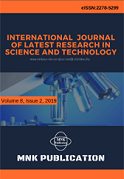DOI:10.29111/ijlrst ISRA Impact Factor:3.35
Research Paper Open Access
International Journal of Latest Research in Science and Technology Vol.5 Issue 6, pp 30-34,Year 2016
Correspondence should be addressed to :
Received : 02 November 2016; Accepted : 04 December 2016 ; Published : 31 December 2016

| Download | 125 |
|---|---|
| View | 181 |
| Article No. | 10692 |
In this paper the findings from a two year action research study are presented. The focus of the study was the use of ICT in the subject of 6th grade History. Groups of students studying History were assigned different tasks and their interaction was transcribed and analyzed. Patterns of collaboration were observed and two theoretical frameworks were implemented in studying them. The first was the use of ICT as a cognitive tool. The second was a scheme describing the Zone of Proximal Development (ZPD) in group work. Three research cycles were designed and implemented. The results showed that only in the 2nd research cycle the suggested ZPD scheme was applicable.
Copyright © 2016 Aikaterini I. Mavrantonaki et al. This is an open access article distributed under the Creative Commons Attribution 4.0 International (CC BY 4.0) license which permits unrestricted use, distribution, and reproduction in any medium, provided the original work is properly cited.
Aikaterini I. Mavrantonaki , " Studying Zpd In Ict Learning Environments ", International Journal of Latest Research in Science and Technology . Vol. 5, Issue 6, pp 30-34 , 2016

MNK Publication was founded in 2012 to upholder revolutionary ideas that would advance the research and practice of business and management. Today, we comply with to advance fresh thinking in latest scientific fields where we think we can make a real difference and growth now also including medical and social care, education,management and engineering.

We offers several opportunities for partnership and tie-up with individual, corporate and organizational level. We are working on the open access platform. Editors, authors, readers, librarians and conference organizer can work together. We are giving open opportunities to all. Our team is always willing to work and collaborate to promote open access publication.

Our Journals provide one of the strongest International open access platform for research communities. Our conference proceeding services provide conference organizers a privileged platform for publishing extended conference papers as journal publications. It is deliberated to disseminate scientific research and to establish long term International collaborations and partnerships with academic communities and conference organizers.